Key takeaways:
- Journaling acts as a powerful tool for personal growth, providing emotional clarity and helping to articulate thoughts and feelings.
- Setting clear intentions and utilizing specific techniques, like SMART goals and prompts, can enhance focus and motivation in the journaling practice.
- Regularly tracking progress and celebrating small wins fosters reflection and maintains momentum, making journaling a vital part of daily routines.
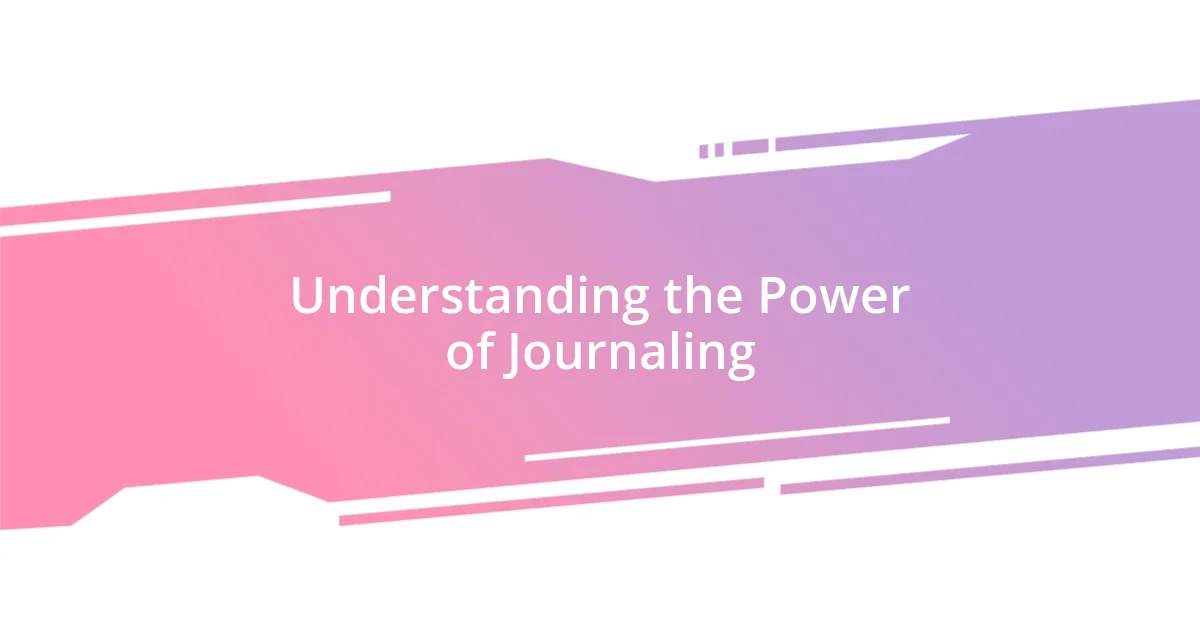
Understanding the Power of Journaling
Journaling has this incredible ability to unlock thoughts and feelings that often swirl in our minds unnoticed. I remember sitting down after a particularly challenging day and just letting my pen flow, feeling a sense of relief wash over me with every word. Isn’t it fascinating how, in that sacred space, my worries transformed into tangible sentences?
When I reflect on my journey, I realize that journaling serves as a mirror, allowing me to confront my emotions head-on. There were moments when I felt overwhelmed, yet writing helped me dissect the chaos, revealing underlying patterns I hadn’t seen before. Have you ever noticed how putting pen to paper can illuminate emotions that words alone can’t express?
In essence, journaling is more than just recording events; it’s a tool for personal growth. Each entry is like a chapter in my own story, revealing insights and guiding me toward decisions that align with my true self. How often do we take a moment to reflect on our paths and the lessons that emerge along the way?
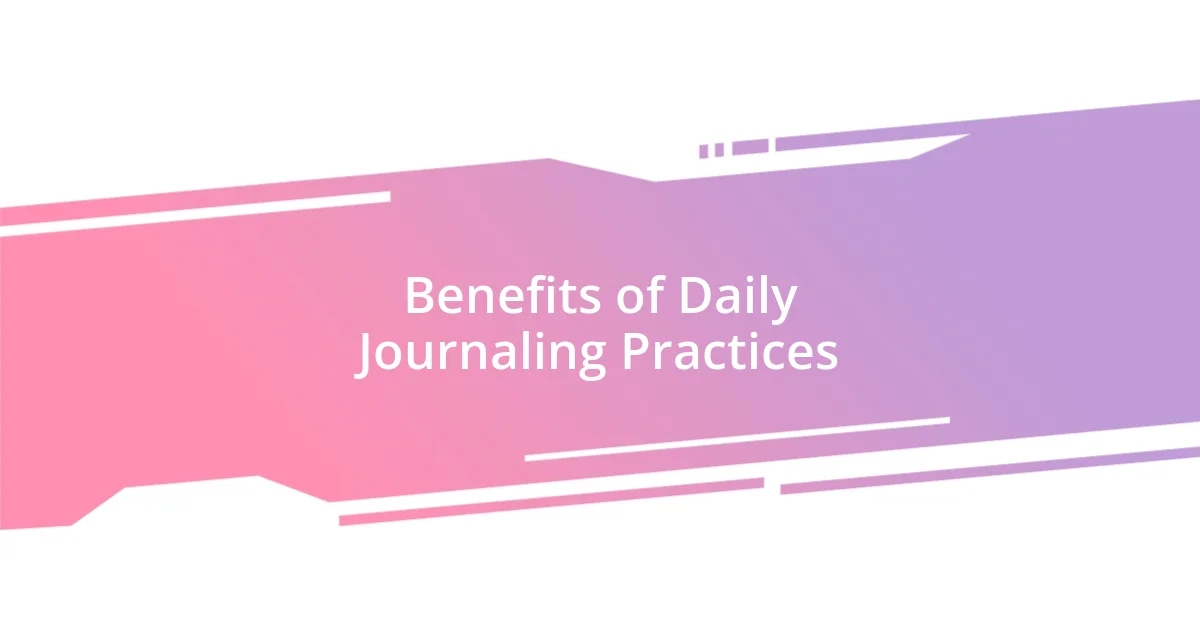
Benefits of Daily Journaling Practices
Daily journaling offers numerous benefits that can significantly enhance both mental clarity and emotional well-being. For instance, I’ve found that setting aside just a few minutes each day allows me to articulate my thoughts, making them less daunting. This practice has not only reduced my anxiety but has also provided me with a roadmap to navigate my emotions.
One particularly powerful aspect of journaling is its role in boosting creativity. When I put my thoughts on paper, it often leads me to unexpected ideas and solutions. There are days when I start with a mundane thought, and by the end of the page, I’ve crafted a full-blown plan for a project or an intriguing concept I never anticipated!
Moreover, daily journaling cultivates self-discipline and reflection. I’ve made it a ritual to write every night before bed, which paves the way for restful sleep. Through this process, I can evaluate my day, celebrate small wins, and set intentions for tomorrow, essentially turning my journaling time into a powerful tool for personal growth and motivation.
| Benefit | Description |
|---|---|
| Emotional Clarity | Helps articulate feelings, reducing anxiety and stress. |
| Enhanced Creativity | Encourages new ideas and problem-solving through free expression. |
| Self-Discipline | Establishes a routine that promotes reflection and personal growth. |
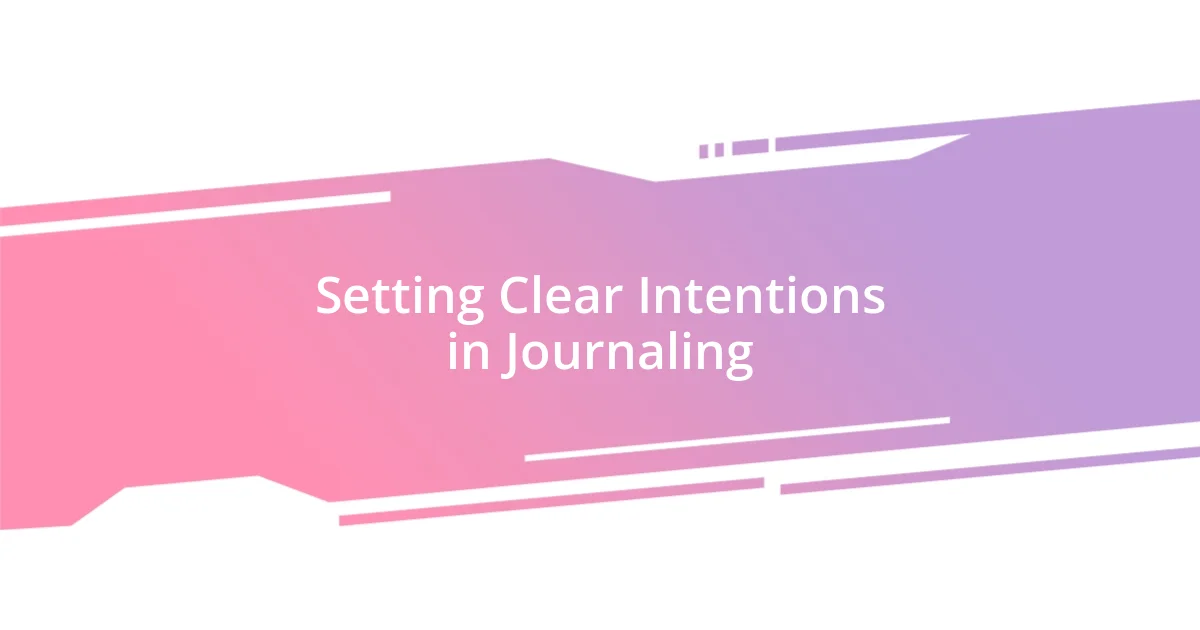
Setting Clear Intentions in Journaling
Setting intentions in journaling is something I approach with great care. The act of writing becomes more meaningful when I pinpoint exactly what I wish to explore or achieve. I remember one day feeling particularly stagnant in my career. I clearly defined my intention: to identify what truly motivates me. As I wrote, insights flowed, revealing not just my passions but also the barriers I had unknowingly built.
To set clear intentions in your journaling practice, consider these steps:
- Be Specific: Define your focus for each session. Instead of a vague intention like “I want to feel better,” try “I want to understand my feelings about my job.”
- Write Affirmations: Use positive statements that reinforce your intentions, creating a mental shift towards action.
- Visualize Outcomes: Picture what achieving that intention looks like. I often close my eyes and imagine completing a project, which sparks motivation as I write.
- Reflect Regularly: Check back on your intentions. I love re-reading past entries to see how far I’ve come and what I’ve learned along the way.
By deliberately setting these intentions, journaling transforms from a simple habit into a powerful launching pad for growth.
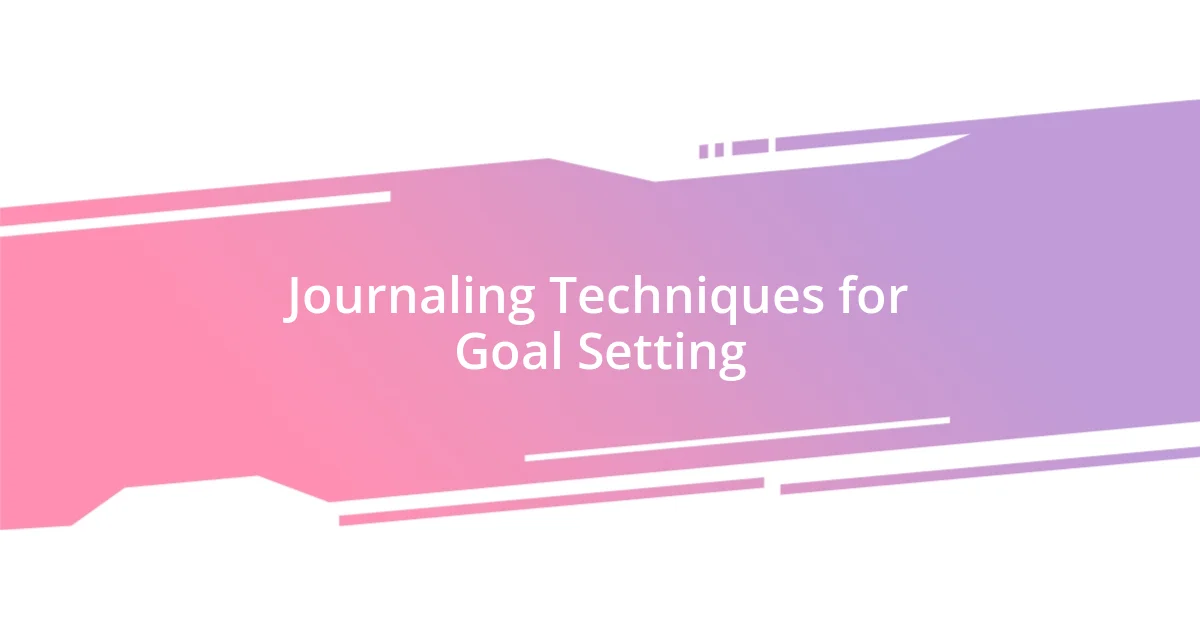
Journaling Techniques for Goal Setting
When it comes to journaling techniques for goal setting, one method I frequently use is the SMART criteria. I was wrestling with a vague ambition of wanting to “get fit” until I decided to write down a specific goal: “I will run a 5K in three months.” That clarity was like a light switch; it transformed my approach from wishful thinking into actionable steps. By ensuring goals are Specific, Measurable, Achievable, Relevant, and Time-bound, I find that I am not only clearer about what I’m aiming for but more motivated to chase that goal.
Another technique is the “reverse journaling” approach. This is a bit unconventional, but I’ve found it incredibly effective. Instead of writing about where I am, I jot down where I want to be. For example, after a long day, I might pen a letter to my future self describing the successful finish line of a project I’m working on. It feels almost surreal, but it encourages me to take daily actions that align with that vision. Have you ever imagined a future version of yourself? Those moments can shift your mindset from feeling trapped to feeling empowered.
Additionally, I’ve delved into mind mapping as a technique to link my goals visually. I start with a central goal and branch out with smaller tasks or ideas. This wasn’t just a random doodling exercise for me; it became an engaging way to visualize progress. One time, I mapped out steps for a small business idea, and by the end, I had a clear path. It genuinely felt inspiring to see how these seemingly tiny tasks could converge into a larger vision. How do you visualize your goals? Sometimes, turning abstract ideas into visuals can bring them to life.
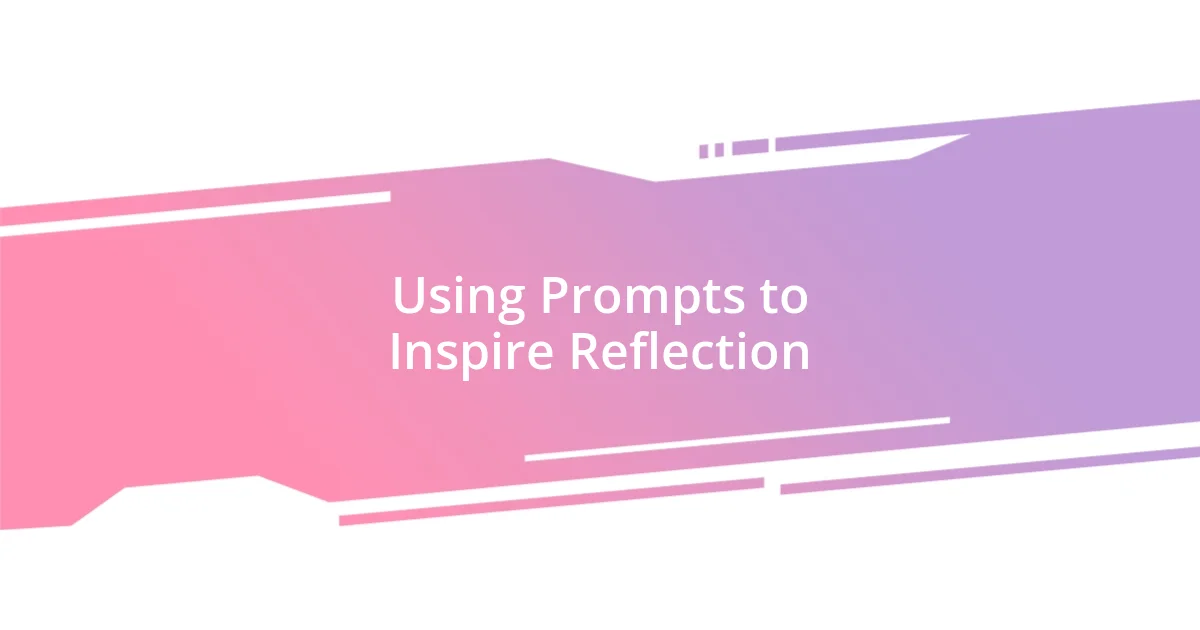
Using Prompts to Inspire Reflection
Using prompts can be a transformative part of my journaling practice. I distinctly remember a moment when I stumbled upon the prompt, “What does success look like for me?” I was taken aback by how much emotion bubbled up as I wrote. This one question not only helped me clarify my goals but also connected me to deeper desires within myself. It was a reminder that success isn’t always a checkmark on a to-do list; sometimes, it’s a profound sense of fulfillment.
Another approach I embrace is keeping a list of open-ended questions. For instance, I went through a phase where I continually pondered, “What holds me back?” As I explored this prompt repeatedly, the reflections unfolded with layers I never anticipated. It surprised me to uncover fear and self-doubt hiding beneath the surface. The act of repeatedly confronting these questions not only inspired reflection but also cultivates an ongoing conversation with myself that feels incredibly revealing and empowering.
I also love using creative prompts like “Write a letter to your younger self.” This prompt, in particular, struck a chord for me during a tough time. As I poured out my thoughts, I found solace in acknowledging both my struggles and strengths. It felt cathartic to advise my younger self, reminding me that growth takes time and that every setback adds to my story. Have you ever tried writing from a different perspective? I find it encourages a unique, compassionate lens through which I can view my own experiences.
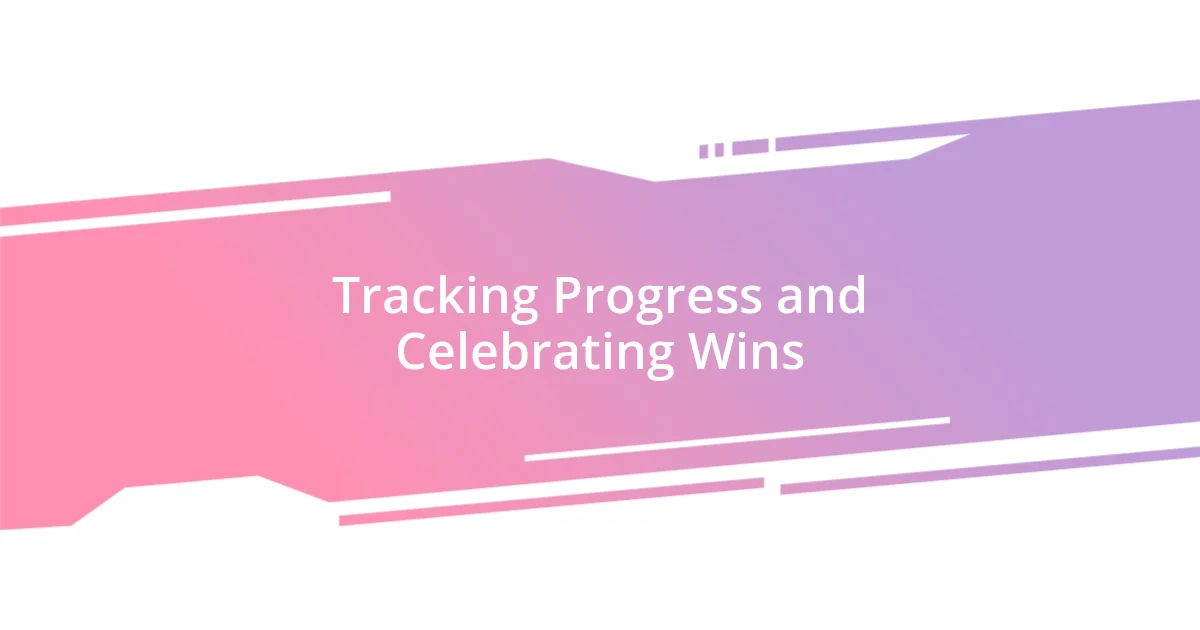
Tracking Progress and Celebrating Wins
Tracking my progress regularly has been a game-changer in my journaling routine. After completing a task or achieving a goal, I take a moment to jot down how I felt during that experience. I recall celebrating my first completed project by writing about the exhilaration and pride I felt. There’s something incredibly fulfilling about capturing those emotions; it solidifies the experience in my mind and makes me eager to chase the next milestone. Do you ever pause to reflect on your feelings after a win?
One effective way I track progress is through a simple weekly review. At the end of each week, I write down three wins—big or small—along with what I learned from each experience. This practice not only boosts my motivation but also helps me see the patterns in my growth journey. I remember one week where I felt particularly unproductive, yet when I reviewed it, I found I had explored a new skill and made connections that were invaluable. What if you took a moment to dive into your week like this? You might be amazed by what you uncover.
Celebrating milestones, no matter how small, is essential for maintaining momentum. I often reward myself with something simple, like treating myself to a favorite snack or taking time for a good book. Recently, after hitting a significant writing goal, I indulged in a mini spa night at home, soaking in the recognition of my hard work. It’s the little celebrations that recharge my spirit and remind me that every step counts. How do you make room for celebration in your life? It’s a crucial aspect of fueling our journeys forward.
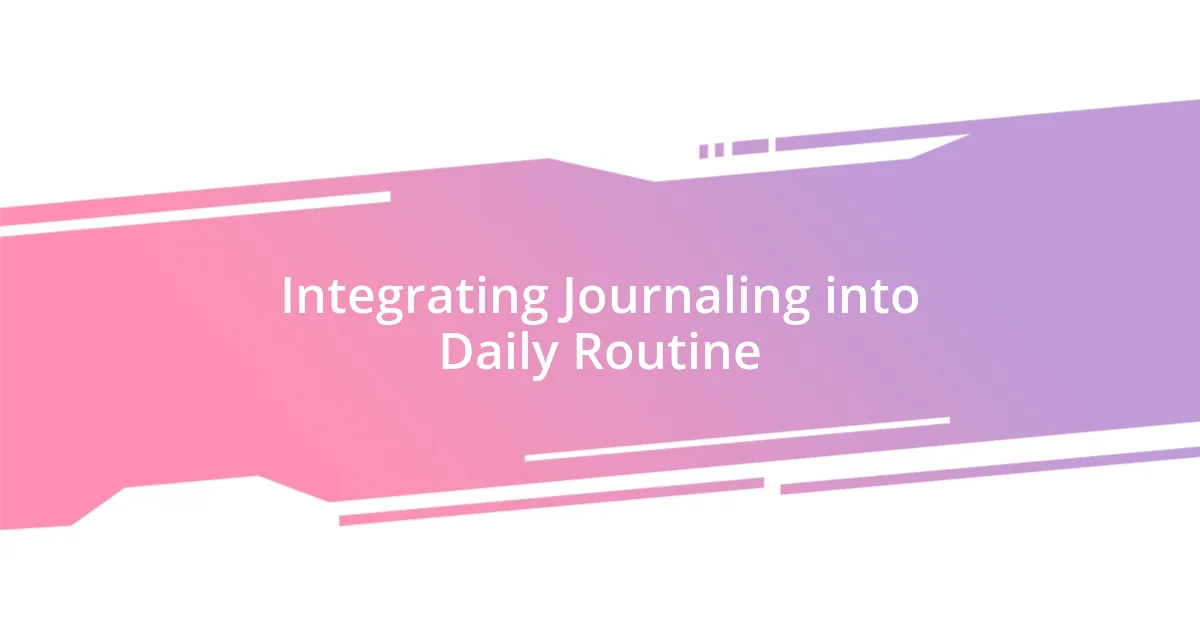
Integrating Journaling into Daily Routine
Integrating journaling into my daily routine doesn’t have to be complex. I’ve found that setting aside even just five minutes each morning can create a meaningful habit. I remember feeling overwhelmed by my to-do list, so I started my day by simply jotting down my thoughts. It helped me clear mental clutter and focus on what truly mattered. Have you ever noticed how a little quiet time can shift your perspective?
I often tie my journaling practice to existing routines to make it stick. For example, I always journal with my morning coffee; it’s a cozy ritual that enhances both my caffeine fix and self-reflection. During these moments, I let my thoughts flow freely onto the page, often resulting in unexpected insights about my day ahead. What if you paired your journaling with another daily activity? You might find it easier to incorporate it into your life.
Incorporating journaling into my evenings has also been transformative. At the end of the day, I reflect on my experiences, jotting down lessons learned and gratitude moments. Just the other night, I thought of a challenging conversation I had and explored my feelings around it. This practice not only facilitated emotional release but also deepened my understanding of interpersonal dynamics. Don’t you think nightly reflections can be a powerful way to unwind? As we peel back the layers of our daily lives, we might just discover the golden threads of wisdom woven throughout.














